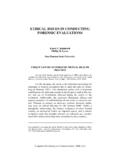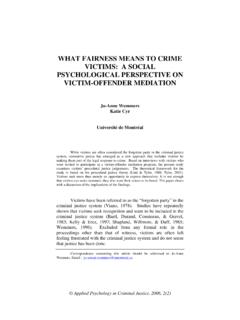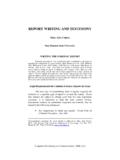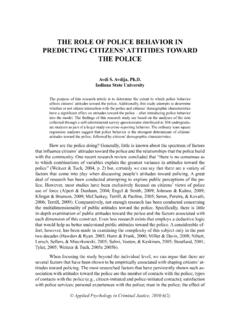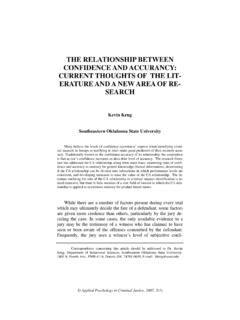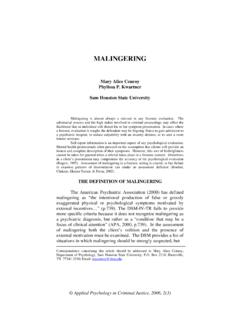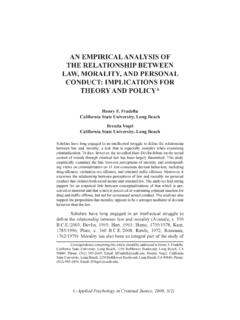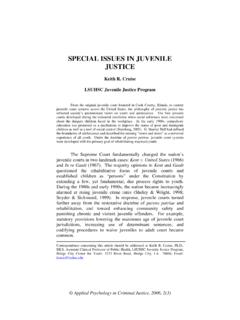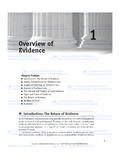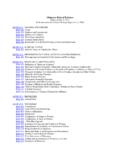Transcription of Competency to Stand Trial
1 Competency TO Stand Trial Randy K. Otto University of South Florida The notion that defendants must be capable of assisting in their defense and participating in the legal process can be traced to at least the 14th century, when Common Law courts refused to proceed against defendants considered to be incompetent as a re-sult of mental disorder or mental defect (Poythress, Bonnie, Monahan, Otto, & Hoge, 2002). Using an approach to forensic assessment introduced and refined by Grisso (1986; 2003), this chapter first reviews the legal framework for the competence question, next offers a template for assessing defendants whose competence to proceed1 with the criminal process has been raised as an issue, and finishes with a discussion of special topics and issues relevant to the competence question.
2 LEGAL FRAMEWORK Common Law Conceptions As noted above, the criminal courts have long required that defendants accused of offenses and appearing in court be ca-pable of understanding and participating in legal proceedings. This requirement is considered to serve multiple purposes including promoting dignity, accuracy, and autonomy (Poythress et al., 2002; Wulach, 1980). First, the dignity and fairness of the criminal jus- This article is based, in part, on a chapter that is in press: Otto, R. K., & DeMier, R. Assessment of competence to proceed in the criminal process, in H. Hall (Ed.)
3 , Forensic psychological assessment. New York: CRC Press/Taylor & Francis Group. Correspondence concerning this article should be addressed to Randy Otto, , 1. Although the reader may be more familiar with the concept of compe-tence to Stand Trial the term used to refer to this issue throughout this chapter will be competence to proceed because this more accurately reflects the legal requirement that a criminal defendant have the capacity to participate in the le-gal proceedings throughout, from the time of his detention and arrest, until the time of his disposition. Applied Psychology in Criminal Justice, 2006, 2(3) OTTO 83 tice system demands that persons who are subject to the resources of the state during the course of a criminal prosecution have an awareness of the proceedings.
4 Trying those who are so impaired that they cannot aid in their defense or are unaware of the nature and purpose of the proceedings against them is considered to chal-lenge both the dignity of the legal process and conceptions about fundamental fairness. Additionally, both the accused and the criminal justice system s investment in accurate decision making is considered to preclude involvement in criminal proceedings of those deemed to lack basic capacities. A criminal defendant s abil-ity to provide information helpful to his or her defense and chal-lenge allegations made against him or her may be compromised by an underlying mental disorder, and result in less accurate and just verdicts and outcomes.
5 Finally, the law s recognition that it is ul-timately the accused who is to make decisions about important le-gal strategies and decisions and his or her involvement in the legal system (with the assistance of an attorney) requires that the defen-dant have the capacity to do so. Constitutional Contours A comprehensive review of the law regarding competence to proceed in the criminal process is beyond the scope of this chap-ter. The interested reader is directed to review Melton, Petrila, Poythress, & Slobogin (1997), Stafford (2003), and Grisso (2003) for reviews of Constitutional issues, and Texas Code of Criminal Procedure Art.
6 See and Shuman (1997) for a detailed re-view of the Texas legal process. Reviewed below are those legal issues most pertinent to conducting competence to proceed evalua-tions in the state of Texas. Consistent with Common Law underpinnings, the Constitu-tion requires that defendants be competent to participate in the criminal justice process. In Dusky v. United States (1960) the Su-preme Court ruled that a defendant must have sufficient present ability to consult with his lawyer with a reasonable degree of ra-tional [and have a] rational as well as factual un-derstanding of the proceedings against.
7 Although Dusky Applied Psychology in Criminal Justice, 2006, 2(3) 84 Competency identified that which the Constitution requires as a minimum in order for a criminal prosecution to proceed, most states have adopted some variant of the Dusky language and approach (Grisso, 2003). As is often the case, analysis of the legal standard enunci-ated in Dusky suggests a more complicated landscape than a quick review of the holding would suggest. Perhaps most significant is that the standard does not delineate or describe any predicate con-ditions that may be responsible for any deficits in capacity ( , mental illness, mental retardation, normal limitations associated with youth-see Otto & Borum, 2004; Otto & Goldstein, 2005; Grisso, 1997; Grisso, 2003, and Cruise, this vol.)
8 , for further dis-cussion of competence issues as they relate to youth). However, essentially all states limit findings of incapacity to those that are considered to flow from a mental impairment ( , mental illness, mental retardation or other cognitive impairment). The Dusky lan-guage referring to sufficient ability and a reasonable degree of understanding suggests that the defendant s abilities need not be complete and without impairment. Reference to present ability makes clear that considerations should be based on a defendant s competence related abilities in the present and the immediate fu-ture, whereas the reference to capacity suggests that factors such as a lack of knowledge about the proceedings or process, or an unwillingness to participate in the proceedings or work with one s attorney do not render a defendant incompetent to proceed.
9 Fi-nally, the test s reference to both factual and rational under-standing on the part of the defendant indicates that the competence requirement demands more than simple knowledge of facts and factors relevant to the proceedings, but also an ability to appreciate and consider those facts that is not significantly impaired by men-tal disorder. Competence is ultimately a legal issue that is to be decided by the legal decision maker. Although the mental health profes-sional may be able to provide the legal decision maker with infor-mation that it can rely on with respect to considering the defen-dant s competence to proceed, it is ultimately a moral-legal deci-sion (also see below).
10 Competence can also be context specific, so Applied Psychology in Criminal Justice, 2006, 2(3) OTTO 85 that a defendant might be incompetent to Stand Trial on one charge ( , an allegation of complicated security fraud) and, at the same time, be competent to Stand Trial on another charge ( , a simple charge of driving with a suspended license) (Roesch, Zapf, Gold-ing, & Skeem, 1999). Texas Law and Procedure Texas, like many states, has adopted the Dusky language in toto (Tex. Crim. Proc. ), although it uses the more specific competence to Stand Trial language as opposed to the more ge-neric competence to proceed language (see footnote 1).
